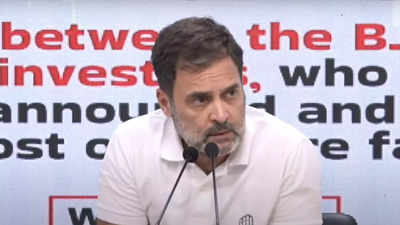
During a recent public address, Gandhi criticized the current administration's handling of economic policies, specifically targeting the stock market's performance and its perceived volatility. He suggested that the market's fluctuations are a direct consequence of government mismanagement, which, according to him, reflects broader economic instability.
The BJP has swiftly condemned Gandhi's comments, calling them misleading and harmful to the country's economic interests. They argue that such statements can erode investor confidence, potentially affecting market performance and economic stability. Party spokespersons have accused Gandhi of playing politics with economic issues, emphasizing that his comments could negatively influence both domestic and international investors' perceptions of India.
In response to the BJP's criticism, Gandhi's office has defended his remarks, asserting that they are based on genuine concerns about economic governance. They argue that highlighting potential issues within the market is a necessary part of democratic scrutiny and debate. The Congress party, which Gandhi leads, maintains that their stance is intended to foster transparency and accountability, rather than to damage the market.
Economic analysts have weighed in on the controversy, noting that while political statements can impact market sentiment, the overall stability of the market is influenced by a wide range of factors. These include global economic conditions, domestic policy decisions, and investor behavior. Analysts caution against attributing market fluctuations solely to political rhetoric, emphasizing the need for a nuanced understanding of market dynamics.
The stock market itself has shown resilience in the face of political commentary. Despite the fluctuations observed in recent months, market experts indicate that the underlying economic fundamentals remain strong. Investment flows and market indices continue to reflect a complex interplay of domestic and global economic conditions rather than solely responding to political statements.
The BJP's criticism highlights the ongoing tension between political figures and economic institutions in India. As the political discourse surrounding economic policies intensifies, the role of political rhetoric in shaping market perceptions remains a contentious issue. The debate underscores the broader challenges facing India's economic governance and the impact of political narratives on investor sentiment.
As the situation develops, the focus will likely remain on how political statements influence market confidence and how both parties address the underlying economic issues at stake. The interaction between political rhetoric and market performance continues to be a critical area of scrutiny for policymakers, investors, and analysts alike.
This controversy illustrates the broader dynamics of political influence on economic perceptions, demonstrating how statements by key political figures can reverberate through financial markets and affect public confidence. The ongoing debate between the BJP and Rahul Gandhi will likely shape future discussions on economic policy and market stability in India.
